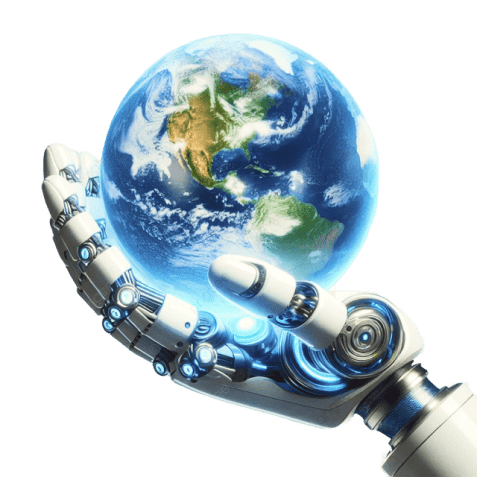
Why AI Needs to Be Decentralized: A Blueprint for a Fairer Future
Artificial intelligence (AI) is reshaping the world as we know it, driving innovations across industries and unlocking new potentials in healthcare, finance, education, and more. However, with this rapid advancement comes a critical issue—AI’s growing centralization. Today, AI technologies are primarily developed and controlled by a small number of large tech corporations and governments. This centralization raises significant concerns around control, fairness, privacy, and access.
The solution? Decentralizing AI. By spreading the development, deployment, and governance of AI across multiple actors and networks, decentralization can ensure that AI serves humanity equitably and transparently. Here’s why decentralizing AI is crucial for the future.
1. Reducing Monopoly Power and Bias
The current state of AI is dominated by a handful of companies with access to vast computing resources, proprietary algorithms, and massive datasets. These entities control the direction of AI research, development, and application, often leading to systems that reflect their interests. This concentration of power creates a risk of monopolistic control over a technology that will shape the future of society.
A centralized AI system may also perpetuate biases because it’s built by a limited pool of developers and influenced by the agendas of a few organizations. Decentralized AI, on the other hand, encourages diversity in development, bringing in a wider range of perspectives, values, and experiences. This leads to more balanced, unbiased, and inclusive AI systems.
2. Enhancing Privacy and Data Control
In centralized AI models, massive amounts of user data are collected, stored, and processed by large corporations, often without adequate transparency. This raises significant concerns about privacy violations, data misuse, and surveillance. Moreover, centralized control over AI systems puts users at the mercy of corporations or governments when it comes to how their personal data is used or accessed.
Decentralization offers a solution to these privacy concerns. Through decentralized networks and blockchain technology, users can have greater control over their own data. Personal information can be stored and processed in distributed systems without relying on a single authority. This minimizes the risk of data breaches and ensures that individuals have more control over who accesses and uses their data.
3. Democratizing Access to AI
One of the most significant issues with centralized AI is that access to cutting-edge AI tools and resources is limited to those with substantial financial and technological power. For small businesses, startups, and individuals in developing countries, this means they may be left behind in the AI revolution, deepening the global digital divide.
Decentralizing AI allows broader access to powerful AI technologies. With decentralized networks, developers and businesses of all sizes can contribute to and benefit from AI innovations. Open-source AI frameworks, distributed computing platforms, and decentralized data marketplaces can level the playing field, enabling more equitable access to the benefits of AI across the globe.
4. Encouraging Collaboration and Innovation
Centralized AI systems can stifle innovation because they are tightly controlled and proprietary. Only a few organizations have the resources to experiment with and deploy AI solutions on a large scale. This limits the potential for groundbreaking discoveries, as the number of players driving the development of AI is confined to a select few.
In contrast, decentralized AI fosters collaboration by allowing diverse actors—individual developers, academic researchers, startups, and even citizen scientists—to contribute to AI’s growth. Decentralized networks enable collaborative problem-solving, where innovation can flourish through shared efforts and a diversity of approaches.
By decentralizing AI, we can create a system where knowledge and resources are shared more freely, leading to faster advancements and breakthroughs. It encourages a community-driven approach to AI, ensuring that the technology evolves in a more transparent and cooperative environment.
5. Improving AI Security and Resilience
Centralized AI systems are vulnerable to various types of cyberattacks, hacking, and even state-level interference. If a single entity or centralized system controls AI infrastructure, a successful attack could have devastating consequences. In contrast, decentralized AI systems spread the risk by distributing control and decision-making across multiple nodes or participants.
Decentralized AI improves security by eliminating single points of failure. If a portion of the decentralized network is compromised, the system can continue to function securely, thanks to its distributed nature. This increases the overall resilience of AI systems, making them harder to attack, manipulate, or control from a single point.
6. Ensuring Ethical AI Governance
A critical concern in the AI debate is how we ensure that AI technologies are developed and governed ethically. Centralized control of AI raises questions about transparency, accountability, and fairness. Who decides how AI systems are used? How do we ensure that AI is developed for the common good, rather than the benefit of a few?
In a decentralized AI system, governance is more transparent and democratic. Decisions about the development and deployment of AI systems can be made collectively, involving multiple stakeholders such as developers, users, regulators, and ethicists. Decentralized governance models ensure that no single entity has disproportionate control, and decisions are more likely to reflect the needs and values of the broader society.
Conclusion: A Future Built on Decentralization
As AI continues to evolve, the need for decentralization becomes ever more pressing. A decentralized approach to AI can ensure that the technology benefits everyone—not just a select few. By distributing control, enhancing privacy, fostering innovation, and improving security, decentralization offers a pathway to more equitable and ethical AI systems.
To make this vision a reality, stakeholders from all sectors—governments, businesses, developers, and citizens—must actively participate in building decentralized AI frameworks. The future of AI is not just about technological advancements, but also about ensuring that those advancements are accessible, transparent, and aligned with the values of a fair and just society.


